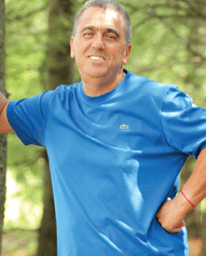 Leon Rozenblat, 56, hadn’t been feeling well despite four stents his cardiologist had inserted and normal stress test results. Leon was experiencing a sense of pressure on his chest, constant fatigue, flushing and severe headaches.
Leon Rozenblat, 56, hadn’t been feeling well despite four stents his cardiologist had inserted and normal stress test results. Leon was experiencing a sense of pressure on his chest, constant fatigue, flushing and severe headaches.
Unable to drive back to his cardiologist on Long Island, Leon made an appointment, at his wife’s urging, with Jatinchandra Patel, DO, board-certified interventional cardiologist with Garden State Heart Care and on staff at CentraState Medical Center. Although initially skeptical about starting over with a new cardiologist, Leon relaxed upon meeting Dr. Patel.
“I trust him,” Leon says. “How he explained everything. Right away, I started trusting him.”
“Leon’s symptoms were very classic,” Dr. Patel says. “He had shortness of breath and a feeling of fatigue upon exertion.”
For diagnostic purposes, Dr. Patel recommended a catheterization in CentraState’s Cardiac Catheterization Lab. Dr. Patel explains that “in certain situations where there are multiple blockages in multiple arteries or a major blockage in the left main artery, stress tests can be inconclusive, so further testing can be necessary.”
Cardiac catheterization is a nonsurgical, diagnostic procedure used to detect blockages in the circulation of the heart and to assess the general health of the heart. To increase patient comfort, decrease bleeding risk and reduce recovery time for the procedure, Dr. Patel uses the radial artery approach, which involves threading the catheter through an artery in the wrist rather than the groin.
Leon readily agreed to the radial artery approach, appreciating the shorter recovery time. However, Leon’s catheterization revealed a 90 percent blockage in his left main coronary artery. Dr. Patel immediately admitted him to CentraState for stabilization and arranged for triple bypass surgery with a cardiothoracic surgeon on Long Island.
Leon and Marina Rozenblat acknowledge the surprising severity of Leon’s condition.
“I’m glad I went to [Dr. Patel] because he basically saved my life,” Leon says.
Dr. Patel echoes Leon’s assessment in saying that “if there were any further delays in diagnosing him, he might not be around today. The No. 1 cause of mortality still in the U.S. is cardiovascular disease.”
Leon just completed 24 sessions in CentraState’s Cardiac Rehabilitation Center, a resource certified by the American Association of Cardiovascular and Pulmonary Rehabilitation, which provides up to 12 weeks of supervised exercise, education about risk factors and lifestyle modifications for patients with cardiac events, according to Marcia Schaefer-Noto, administrative director of Cardiac Services at CentraState.
“I love it there,” Leon says. “I’m staying for 36 sessions. The nurses are very nice, and I feel better. ”





